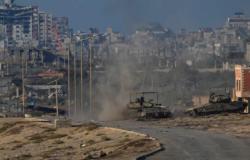High-level officials of the United Nations they have stated to Israel that aid operations will be suspended in all Loopunless urgent steps are taken to better protect humanitarian workers, said two UN officials.
The organization sent a letter this month to senior Israeli authorities. It indicated, among other steps, that the Middle Eastern country must allow UN workers to communicate directly with Israeli forces in Gaza territory, officials explained.
The officials spoke on condition of anonymity to explain ongoing negotiations with Israeli authorities. They said no final decision had been made to suspend operations in Gaza, and that talks with the Israelis were still underway. The Israeli military has so far not responded to a request for comment.
Israel has acknowledged some military attacks against humanitarian workers, such as the one carried out in April, in which seven died workers of World Central Kitchen, while he has denied allegations of committing others.
The World Food Program (WFP) of the United Nations has already suspended its aid shipments from a US-built dock in Gaza, due to security concerns.
The UN and other aid authorities have complained for months that they have no no way to communicate directly and rapidly with Israeli forces on the ground, in contrast to the usual procedures known as deconfliction, in conflict zones around the world to protect humanitarian workers from attacks by combatants.
The UN and aid workers also complain about the increasing anarchy in Gaza, and have urged Israel to do more to improve the overall security of its operations.
“Missiles hit our facilities, despite being conflict-free zones“Steve Taravella, spokesman for WFP, one of the main organizations sending humanitarian aid to Gaza, said Tuesday. “WFP warehouses have been caught in the crossfire twice in the last two weeks,” Taravella said.
He risk of famine which reports from the United Nations already warned about in March, persists today despite the limited humanitarian aid that reaches the Strip, the World Health Organization (WHO).
The agency noted that 96% of the territory’s population, that is, 2.15 million Palestinians in Gaza, suffer from high or higher levels of food insecurity, according to data updated by different UN organizations in the Integrated Classification report. of Food Safety Phases.
A 22% of the population suffers extreme levels of food insecurity, adds the report, which updates the one that in March assured that famine could be declared in May in Gaza if there was no cessation of hostilities.
Since then, according to the WHO in a statement, “the food and services that have reached northern Gaza have alleviated the suffering of the population in that area, although humanitarian access remains very limited.”
The situation, at the same time, has deteriorated significantly in the south of the Strip, due to the escalation of hostilities in the area that has been going on since last month.
“The closure of the Rafah border crossing and access problems at the Karem Shalom border have further restricted humanitarian aid access for almost two million people in the south,” said the United Nations health agency.
Higher concentrations of displaced people in the area have worsened sanitary and hygiene conditions, increasing the risk of epidemic outbreaks “that could have catastrophic effects”added the WHO.
“Only an end to hostilities and immediate, unhindered and sustained access to humanitarian aid can reduce the risk of famine in Gaza,” the Geneva-based organisation concluded.
(With information from AP and EFE)






